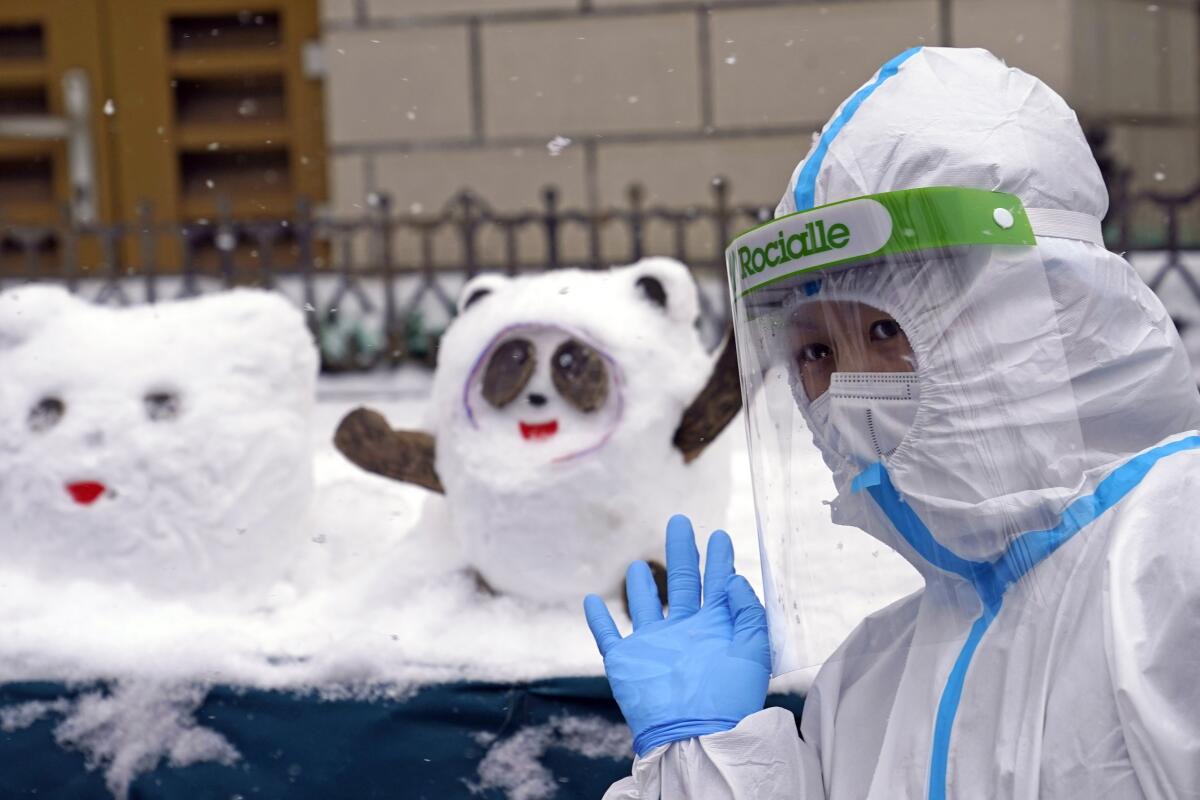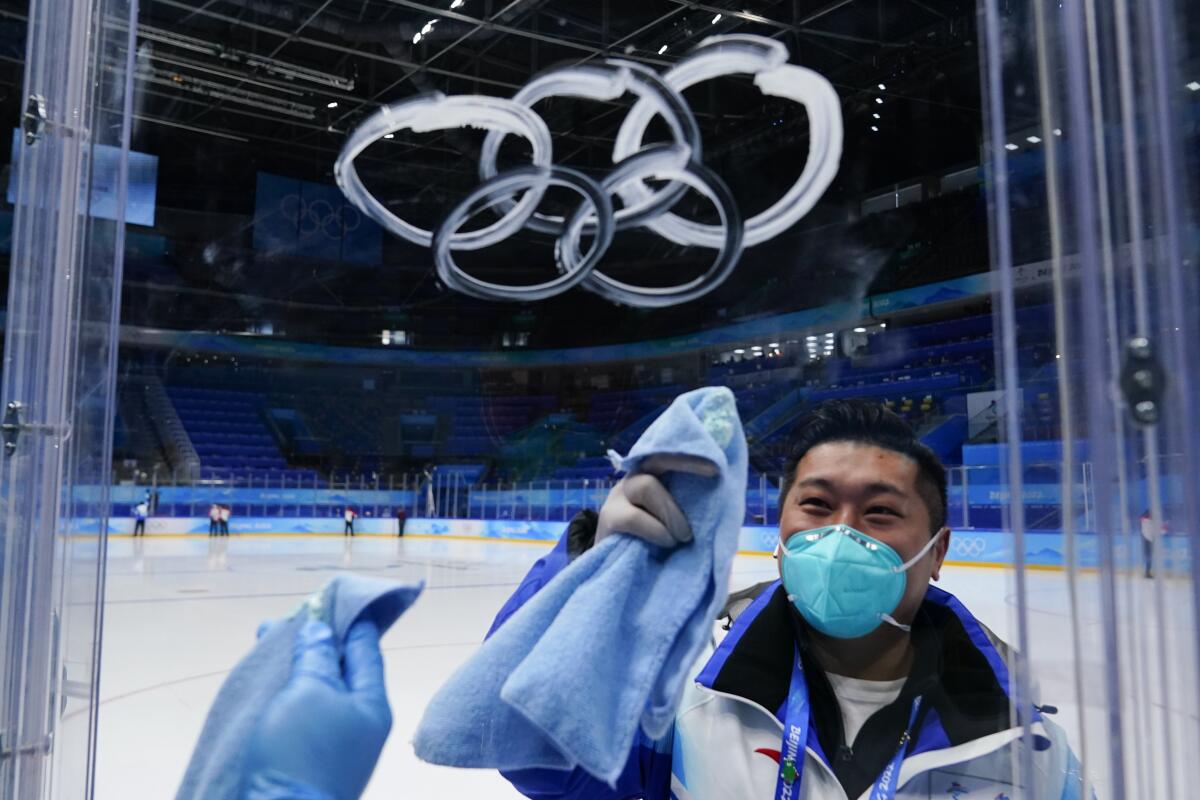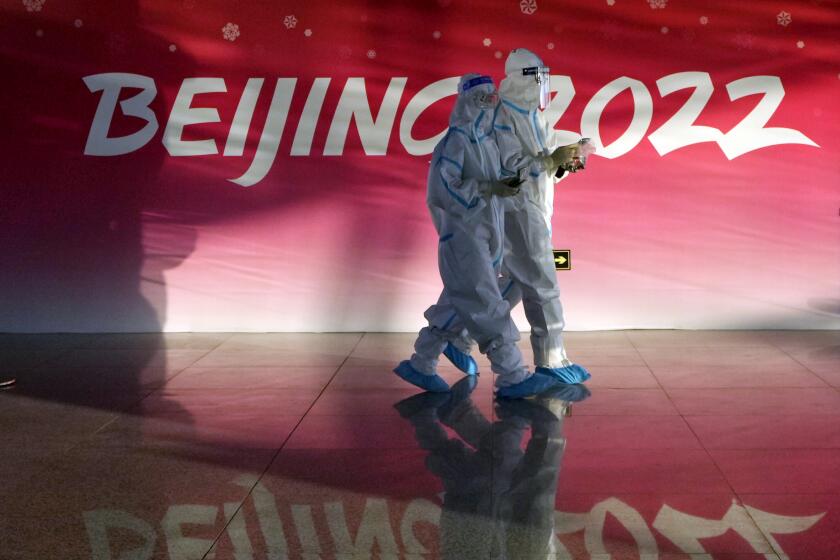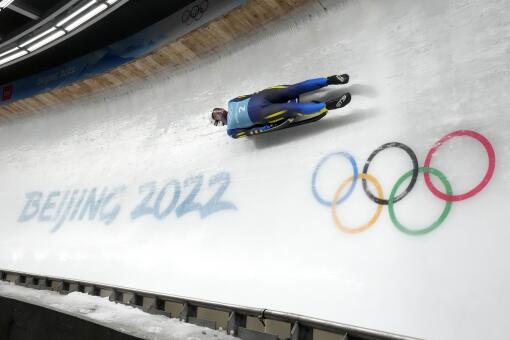Column: Simple acts of kindness made the unusual Beijing Olympic experience bearable

- Share via
BEIJING — On the biggest stage, during the most momentous occasions, it’s often the small moments that become the most memorable.
The Beijing Olympics were restrictive and bleak, the consequence of creating a “closed loop” to keep everyone involved with the Games safe from the coronavirus. We could see restaurants and shops and museums as we rode buses to sports venues but we couldn’t stop in at that big seafood place that always seemed to have a lot of cars out front and we couldn’t go for a walk beyond the barriers.
We weren’t allowed to wander through the aisles of the nearest 7-Eleven, which was a great source of snacks and sustenance under the looser rules that governed visitors at the Tokyo Summer Olympics barely six months ago. A street across from Wukesong Sports Centre featured a KFC and a McDonald’s. We could only salivate from afar.
China’s COVID prevention methods at the Beijing Olympics kept the positive numbers down. However, the effectiveness of some measures was dubious.
We lived in a snow globe, safe inside our pleasant hotel and heavily guarded arenas. We were in Beijing but not part of it, kept at a sterile distance from the life and people of the city. We couldn’t explore or go off the beaten path, preventing us from enjoying some of the great pleasures travel can provide.
That feeling of being so removed from everyday life is why my interactions with volunteers at the venues and with the technicians who had the thankless job of administering the throat swabs for our daily COVID test stand out for me in remembering Winter Games that were unlike any other I’ve covered.
Initially the volunteers seemed hesitant to engage in conversation, though it was impossible to know if that was by choice or by order from Olympic organizers. Gradually, shyly, they began to respond to greetings.
A “hello” was followed by a “How are you?” A “thank you” elicited “You are welcome,” and, as the Games went on, an added “Have a nice day.” One day, a journalist rose from his seat but didn’t tuck his chair back under the table. An exasperated volunteer immediately approached. “What are you, 3 years old?” she said, drawing laughs from everyone who heard — including the person who had so grievously breached chair etiquette.

The volunteers were impressed that I had traveled to Beijing from far-away Los Angeles and were eager to know my opinion of the venue. When I told those who worked at Wukesong they had made the arena my favorite place to visit, they clapped and laughed. One young woman told me to wait because she had a gift for me. She returned with a set of glossy postcards with images of China and proudly presented it to me. It wasn’t expensive, yet it was precious.
The throat-swabbers, too, became kinder as the Games went on. Their pokes became less aggressive and a few apologized for having made me feel uncomfortable. The simple act of establishing a human connection, however brief, made the daily indignity more bearable.
Many big public moments also will stay with me long after my Olympic pins and few souvenirs are gathering dust on a shelf.
The story of Nathan Chen’s gold medal triumph in men’s figure skating couldn’t have been made up. The son of immigrants from China who had little money to spend on their five children, he was coached to victory by Rafael Arutyunyan, who had immigrated to the U.S. from the former Soviet republic of Georgia. The night Chen won, Arutyunyan recalled taking the money Chen’s mother paid him for lessons and giving the bunched-up dollars back to Chen. Stories like that — and there are many — are why the Olympics have the power to inspire.
The pure elation of Mariah Bell, at 25 the “old lady” of the U.S. figure skating team, and Alysa Liu — at 16 the youngest U.S. Olympian — after their artistic performances was uplifting. Elana Meyers Taylor’s silver medal in the women’s monobob bobsled event was a triumph of spirit, earned after she was isolated after a positive test for the coronavirus and couldn’t carry the U.S. flag into the opening ceremony. The Canadian and American women’s hockey teams continued to embody a powerful see-it-and-be-it example. Chloe Kim, otherworldly in winning two halfpipe gold medals in the last two Winter Games, was one of us when she begged reporters for snacks. “I’m starving,” she said, prompting offerings of chocolate bars and crackers.
It will be impossible to forget 15-year-old Russian Kamila Valieva sobbing at rinkside after she stumbled through her free skate program in the women’s figure skating finale and was bombarded with criticism from coach Eteri Tutberidze when she should have received a compassionate hug. She was mistreated not only by Tutberidze but by a system that allowed Valieva to compete after she tested positive for a banned substance on Dec. 25. She’s a child who became a pawn in her coach’s and her country’s ruthless chase for glory. Fair play took a beating. So did figure skating’s shaky credibility. Who knows what toll it will take on Valieva herself.
Every time we boarded the bus to the Main Media Center the driver, hidden away behind Plexiglas, cued a recording that confirmed the destination. When we arrived the recording said, “Take your belongs [sic] and get off the bus.” Time for me to get off the Winter Olympics bus after covering each of the last 12, starting with Lake Placid in 1980. I’m ready to pass the torch and let colleagues take cheaters to task and enjoy exhilarating moments to come that are still in the dream stage now.
More to Read
Go beyond the scoreboard
Get the latest on L.A.'s teams in the daily Sports Report newsletter.
You may occasionally receive promotional content from the Los Angeles Times.









